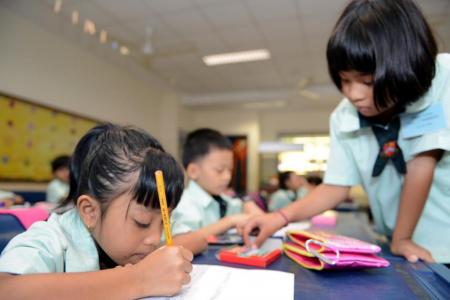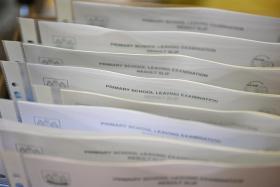New PSLE scoring system has not disrupted Secondary 1 posting trends: MOE
The adoption of the new achievement level (AL) scoring system for the Primary School Leaving Examination (PSLE) has not disrupted Secondary 1 posting outcomes, a senior education official with the Ministry of Education (MOE) said on Saturday (May 21).
Student performance and parents' choices of schools have remained largely stable since the introduction of the new scoring system last year, added deputy director-general of education (curriculum) Sng Chern Wei.
"About 63 per cent of students go to the Express stream, about 24 per cent go to the Normal Academic stream and 12 per cent make it to the Normal Technical stream, which is very comparable to the years under the T-score system.
"So parents of kids going for PSLE this year can be a bit more assured that the system is stable," said Mr Sng, who oversees the design, review and implementation of curriculum from the primary to pre-university levels.
He added that 80 per cent of pupils went to secondary schools that fell within their first three choices, while 90 per cent were posted to one within their first six choices.
He was speaking at The Straits Times Smart Parenting Forum on PSLE Preparation, which was held at The Straits Times studio and attended by more than 500 people online and in person.
In a discussion with The Straits Times' senior education correspondent Sandra Davie, Mr Sng reiterated the reasons behind MOE's decision to change the scoring system - namely to push for a shift away from a preoccupation with academic results and chasing the last mark.
He also spoke on mindsets and gave tips for parents to help their children towards their first national exam.
Last year, the first batch of pupils received their results under the new scoring system, where each standard-level PSLE subject is scored using eight bands known as ALs.
Each pupil is given AL scores from one to eight for each subject, in place of grades like A* to E. Instead of the previous T-scores, a pupil's total PSLE score is now the sum of the AL of each of the four subjects.
Mr Sng also fielded questions from the audience, where some parents requested statistical breakdowns of the number of pupils who received each PSLE score, and the percentages of pupils who received scores of four, five and six.
Ms Davie said some parents had asked these questions in the hope of estimating the likelihood that their children would get into schools that run the Integrated Programme. These are commonly perceived to be top schools.
Mr Sng said MOE would be unlikely to release such data as it detracts from the ministry's intention of moving away from an over-emphasis on academic results.
He said: "Actually, I think it would have the opposite effect of fuelling anxiety about academic results, because when you start knowing that there may be 800 other students having the same aggregate as your child, you may become more anxious."
The changes to the system should be given time to settle in, he said, adding: "I hope parents will recognise the importance of growing up with a happy childhood and not just memories of academic preparation."
After the plenary session with Mr Sng, the audience split into three breakout rooms with guest speakers - mathematics expert Yeap Ban Har, senior British Council teacher Bozena Rupnik and education research scientist Ng Ee Lynn.
Dr Yeap told his audience of about 150 that parents should not be overly concerned if their children cannot complete every question in the much-feared PSLE Mathematics paper.
"If your child can complete basic skills items and familiar applications, that will give them more than two-thirds of the available marks," he said.
"I would say job well done and that the child is ready to progress to the next stage of learning at secondary school."
Get The New Paper on your phone with the free TNP app. Download from the Apple App Store or Google Play Store now


